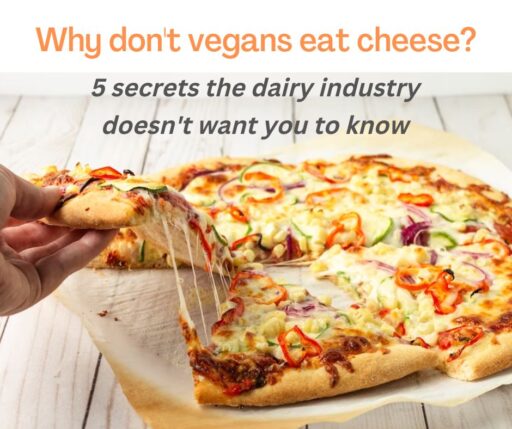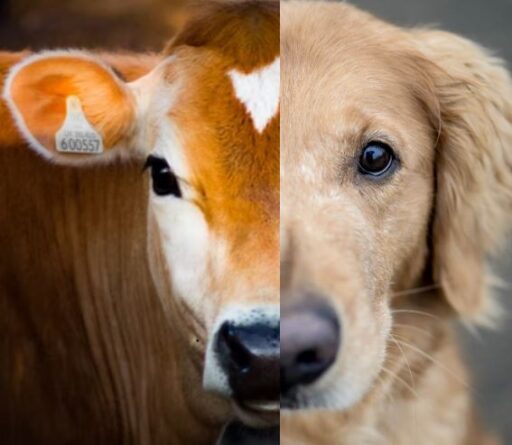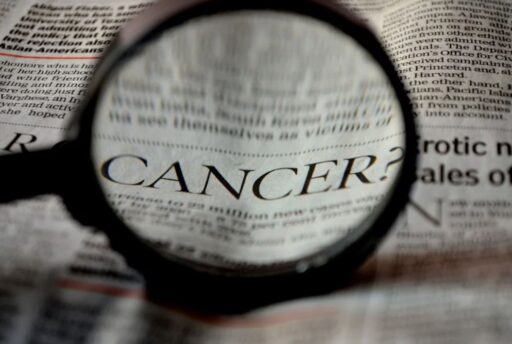Like many people, you might wonder, “Why don’t vegans eat cheese? Don’t cows need to be milked? You don’t have to kill cows for milk, anyway. And isn’t it a good source of calcium?” Yet common myths like these are simply marketing facades that the industry promotes to fuel our insatiable consumption of cheese.
Vegans don’t eat cheese because they avoid all animal products for ethical, health and environmental reasons. Dairy farming is cruel, as it forcibly takes calves away from their mothers and sells male calves for veal. Cheese is packed with saturated fat, sodium and cholesterol and promotes cancers, heart disease, osteoporosis and inflammatory diseases. The industry also degrades the environment and exploits workers.
- 1. Cheese production degrades our air, land and water
- 2. Cheese promotes heart disease, cancers, osteoporosis and inflammatory diseases
- 3. The dairy industry exploits workers
- 4. The dairy industry takes baby calves from their mothers and makes cows suffer
- 5. The dairy industry sends male calves and mother cows to be killed for veal and beef
- The fight against all injustice is one fight
- The dairy industry shows our egocentrism
- So, why don’t vegans eat cheese?
1. Cheese production degrades our air, land and water
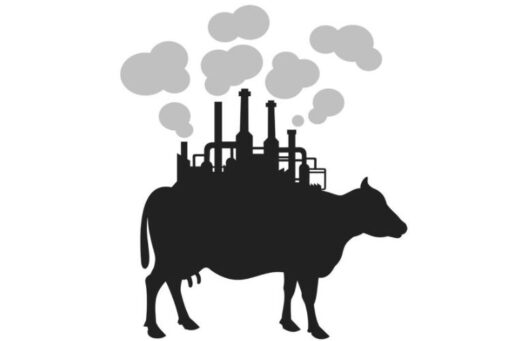
Carbon emissions
Eating 30 grams of cheese a day (just enough to cover two crackers), produces a staggering amount of emissions: 352kg. It’s “the equivalent of driving a regular petrol car 899 miles”, “the same as heating the average UK home for 55 days”, and the same as using “82,703 liters of water” which is equal to 1,272 showers lasting eight minutes.
When it comes to dairy versus non-dairy milks, one glass of dairy milk produces nearly three times the greenhouse gas emissions of any non-dairy milks. Just one glass of dairy milk a day requires about two tennis courts of land, more than ten times the amount of oat milk.
Land and water impact
To create dairy farms and cropland to feed the cows, the industry clears forests, native grasslands and bushlands. This destroys habitats and causes severe biodiversity loss. Dairy farms generate so much manure that the land can’t absorb it all, so it seeps into the earth and groundwater or spills out of lagoons and pollutes waterways, causing chemical waste pollution, killing marine life and degrading local water resources.
Finally, the dairy industry uses enormous amounts of water: to grow the crops to feed the cows, for the cows to drink, and the clean the factory farms and slaughterhouses. All told, one liter of cow’s milk requires 628 liters of water, while soy milk requires only 28 liters. As water becomes an increasingly scarce resource, we cannot afford to be using so much of it on an unnecessary and harmful industry now more than ever.
Thankfully, the solution is simple. By ditching dairy and enjoying plant-based alternatives, we use far less land and water and produce far fewer carbon emissions.
Eating local cheese is environmentally no better
People often believe that local animal products significantly reduce the environmental impact of these products. But the primary atmospheric impact of food is land use, not transport. The production phase of food typically accounts for a whopping 83% of food’s carbon footprint.
In contrast, factors like transport distance contribute only about 10% to a product’s carbon footprint. The two biggest culprits in greenhouse gas emissions are changes in land use (e.g. converting forests into fields) and farming processing (e.g. methane emissions, machinery, emissions from fertilizers).
Eating local does not have a significant impact on carbon emissions because transport is not to blame for a large portion of a food’s carbon footprint. What you eat is far more important than how far it traveled. If you’re buying local animal products, the environmental damage has already been done by the fact that it’s from an animal.
2. Cheese promotes heart disease, cancers, osteoporosis and inflammatory diseases
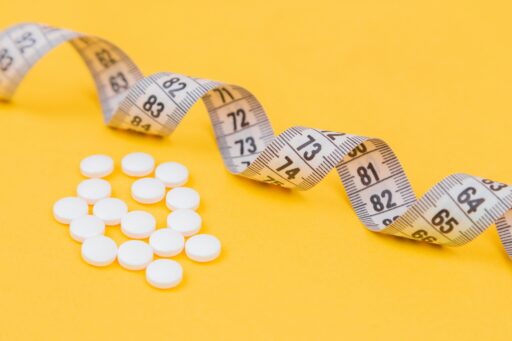
Cheese is addictive
Cow’s milk is not the wholesome product we’ve been led to believe it is. Because it is meant to make a baby calf grow into a 400 pound cow in several months, it is full of growth hormones (IGF). It contains an addictive hormone called casomorphin, designed to generate a feeling of euphoria and attachment so that baby calves continue drinking their mothers’ milk. In cheese, this hormone is extremely concentrated.
As Dr. Michael Kleper puts it, “Cow’s milk is the lactation secretions of a large bovine animal who just had a baby. If you’re not a baby calf, you shouldn’t be eating baby calf fluid.” With this in mind, it makes sense that the majority (65%) of the global population is lactose intolerant. Why would humans naturally have the enzymes needed to digest the milk of other animals?
Dairy promotes cancer development and other diseases
In our bodies, cow’s milk promotes cancer growth, especially prostate cancer and breast cancer. It is linked to the development of type 1 diabetes, and worsened symptoms in arthritis and multiple sclerosis due to inflammation. Packed with calories, fat, cholesterol and sodium, cheese also promotes weight gain and high blood pressure, a risk factor for numerous chronic diseases. Cow’s milk also acidifies our blood and pulls calcium from our bones to neutralize the acid. We then excrete more calcium, which increases our risk of osteoporosis. Furthermore, the antibiotics and natural and artificial hormones in cow’s milk increase propensity for acne.
Given that we have been taught for so long that meat and milk are necessary for human health, how could animal protein and cancer be correlated? It might be hard to believe, but the evidence that animal foods promote disease while plant foods prevent and even treat disease is irrefutable.
What sources support these claims?
High-quality evidence that animal protein and cancer are linked comes from a wide range of reputable sources. They include but are not limited to: the World Health Organization; The China Study (funded by Cornell, Oxford and the China Cancer Institute); nonprofits like the Physicians’ Committee for Responsible Medicine; and academic journals such as the Journal of Geriatric Cardiology, The American Journal of Clinical Nutrition, the European Journal of Epidemiology, the International Journal of Epidemiology, and the International Journal of Environmental Research and Public Health, many of which include systematic reviews and meta-analyses.
Particularly compelling research comes from The China Study: Startling Implications for Diet, Weight Loss and Long-term Health (2005, 2016), one of the most comprehensive studies of lifestyle, diet and disease ever done. The results revealed that animal protein (especially meat, dairy, and eggs) is strongly linked to cancer growth.
Men who ate the most dairy products were up to 65% more likely to develop prostate cancer. Men with prostate cancer who eat 3+ servings of dairy daily having a 141% higher risk of dying from their cancer within 10 years compared to those who eat less than 1 serving a day. Consuming animal-based foods increases the blood levels of the growth hormone IGF-1 (insulin-like growth factor). Much like cholesterol levels predict heart disease, IGF levels predict cancer risk.
Another study found that increasing the casein in rats’ diets promoted the development of breast cancer in rats dosed with carcinogens. Women drinking 2-3 cups of cow’s milk a day (what the USDA recommends) increased their risk of breast cancer by 70-80%. Cow’s milk is full of estrogen, which helps both baby calves and cancer cells grow.
Several well-known doctors who promote plant-based diets include Dr. Colin Campbell, Dr. Esselstyn, Dr. Neal Barnard, Dr. John McDougall, Dr. Michael Greger, Dr. Dean and Alesha Sherzai, Dr. Garth Davis, and Dr. Michael Kleper. You can even find local plant-based doctors and local plant-based dieticians and wellness coaches. For more support from unbiased organizations, check out the American College of Lifestyle Medicine.
3. The dairy industry exploits workers
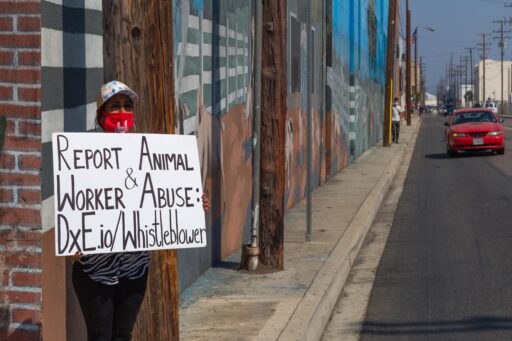
Although the cows suffer the most, they aren’t the only ones who suffer. Many farmers themselves feel great remorse about what they do to these creatures to earn a living.
Animal agriculture exploits farm workers, too
Secondly, workers endure poor working conditions, low wages and debt, and higher rates of physical and mental illness. Because they are often undocumented, they typically lack access to adequate health care and legal protection as well.
Poor working conditions
Most dairy workers receive no holidays, overtime, sick pay, or workers’ comp. Dairy farms are often exempt from paying overtime even with 70-90 hour workweeks, as federal employment laws often don’t apply to them.
Physical & mental health impacts
Dairy farm workers frequently face vile, dangerous conditions. They wade through the noxious-smelling warehouses laden with the much of manure and urine, even sink and get stuck. When cows get scared, such as during storms, they may run at workers and kick them. Having received little to no training and being pressured to move the cows quickly, workers often resort to violent strategies.
Surveys have found that two thirds of dairy workers have been injured on the job. Then, they are either forced to work through injury or illness. If they don’t, they are often fired for getting injured and being unable to work. Farm workers also have increased rates of respiratory ailments, gastrointestinal ailments, and skin infections. Finally, rates of depression and suicide are elevated among dairy farmers compared with other occupational groups.
4. The dairy industry takes baby calves from their mothers and makes cows suffer

In using cows for the production of cheese, these gentle, playful giants suffer greatly. Although cow’s milk has been marketed as a wholesome product, it is anything but.
Cows are like human females in that they only lactate after giving birth. So, to make them give milk, workers artificially inseminate them. They put a hand up the cow’s vagina with forcibly taken bull sperm. When the cow gives birth, farmers typically take her baby away in under a day. They then hook the mother up to machines to sell the milk that her body made for her baby. Farmers then castrate the calves and remove their horns without anesthetic. Female calves are raised for the same cycle.
Physical pain
Through selective breeding, antibiotics and hormones, modern day cows now produce about 10 times the amount of milk they previously did. As a result, they suffer from more mastitis (inflammation of the udder), lameness, susceptibility to disease and decreased lifespan.
Emotional and cognitive distress
Beyond physical suffering, there is great emotional and cognitive distress in the life of a dairy cow. Researchers have proven this with objective measures. When afraid, they resist entering, defecate, cry out and attempt to escape. Their heart beats speed up and the whites of their eyes show more. Their nasal temperatures and ear postures drop.
Abuse is the industry norm
Abuses such as these are inextricable from the industry. But beyond this embedded violence, many undercover investigations have found other widespread abuses. Undercover footage has shown workers kicking cows, beating them with medal rods and using tractors to drag them by an ankle. Workers often resort to this abuse to force cows to move into milking stalls. Despite rampant violence, no one outside the dairy industry monitors its treatment of the animals. Thus, profit dictates industry standards, not the animals’ welfare.
Each time this happens, the industry claims these are isolated cases. Yet it isn’t just “a few bad apples.” Evidence of abuse has surfaced from dairy farms all around the U.S. and the world, such as the United Kingdom, Australia, New Zealand, Germany, Brazil, Wales, New Mexico farms supplying Publix, Texas farms supplying Target and Costco, New York, California, Indiana, Pennsylvania, Ohio, North Carolina, Florida, and Wisconsin.
How many cases does it take before we realize that the system facilitates animal abuse by workers, even if it doesn’t explicitly condone it?
Cows naturally live about 20 years, but their bodies are so abused that their milk-producing abilities last only four to five years. At this point, the industry sends them to be slaughtered for beef. So, dairy an exploitative system that is part and parcel with the meat industry. Arguably, dairy is even worse than meat because a cow suffers its entire life before slaughter. This is how all cow’s milk across the world reaches the grocery aisle.
What about local cheese and milk from small farms?
You may wonder, “What if I get milk products from a small, local farm where calves are allowed to remain with their mothers for several months? What’s the problem with drinking milk that the calf doesn’t need?”
Despite the fact that some smaller farms are less cruel than large scale operations, dairy farming is fundamentally inhumane. Dairy production relies on taking calves from their mothers. It commodifies cows by using their bodies as if they were machines. It relies on the fact that humans have selectively bred farmed animals not to optimize their wellbeing, but for our purposes. Because of this, modern cows often have joint problems, difficulty walking and inflamed udders as a result of the strain of excessive milk production. Finally, it ends with unjustifiably killing them.
5. The dairy industry sends male calves and mother cows to be killed for veal and beef
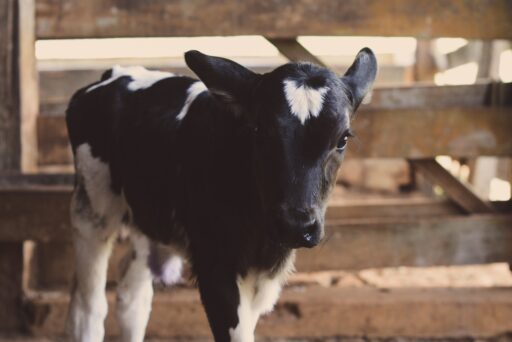
While cows naturally live about twenty years, dairy cows’ bodies are so abused that they only live to be about four to five years old. Have you ever seen a home for elderly cows? What do we think really happens to cows once they are no longer profitable? After cows’ bodies are spent from continual impregnation and lactation, they are killed for beef.
So, dairy is arguably even worse than meat, because a cow suffers her whole life before being sent to slaughter. Additionally, male calves are either killed at birth because they will not produce milk or sold to the veal or beef industry.
What matters is what we have in common
When we consider what cows have in common with our companion animals and even with ourselves, this cruelty is gut-wrenching. Most importantly, cows feel physical and emotional pain. Beyond these basics, they are like us and other mammals in many ways. They like to play by pushing balls, running, galloping, bucking, play-fighting and social licking. They even have individual personalities, complex cognition and friends.
The fight against all injustice is one fight
The public is beginning to become more aware of the cruelty in the life of a dairy cow. In an emotional speech at the 2020 Oscars, Joaquin Phoenix connected this injustice to all other forms of injustice. As he eloquently described, “I think whether we’re talking about gender equality, or racism, or queer rights, or indigenous rights, animal rights, we’re talking about the fight against injustice. We’re talking about the fight against the belief that one nation, one people, one race, one gender, or one species has the right dominate, control, exploit and use another with impunity.”
The dairy industry shows our egocentrism
“I think that we’ve become very disconnected from the natural world. Many of us what we’re guilty of is an egocentric worldview, the belief that we’re the center of the universe. We go into the natural world and we plunder it for its resources…. We feel entitled to artificially inseminate a cow and when she gives birth we steal her baby, even though her cries of anguish are unmistakable. And then we take her milk that’s intended for the calf and we put it in our coffee and cereal.”
“And I think we fear the idea of personal change because we think that we have to sacrifice something, to give something up. But human beings at our best are so inventive and creative and ingenious. And I think that when we use love and compassion as our guiding principles, we can create, develop and implement systems of changes that are beneficial to all sentient beings and to the environment.”
So, why don’t vegans eat cheese?
Vegans don’t eat cheese for five significant reasons. Environmentally speaking, the production of cheese produces an enormous amount of carbon emissions, destroys forests, and contaminates vast amounts of land and water. From a health standpoint, cheese is an addictive substance that promotes cancers, weight gain, diabetes, arthritis, osteoporosis, and multiple sclerosis, among other diseases.
From a human rights rights perspective, cheese is the end result of an industry that exploits farm workers, who endure poor working conditions, low wages, debt, and high rates of physical and mental illness, often without access to health care or legal protection.
Finally, from an animal rights point of view, cheese is the product of an unbelievably exploitative industry that uses the reproductive systems of cows for human profit and takes baby calves from their mothers. The dairy industry causes cows physical pain from mastitis, lameness, susceptibility to disease and decreased lifespan. Dairy cows endure severe emotional and cognitive distress, including widespread abuse from workers. They will ultimately be killed for meat, and their male babies will be killed for veal after a short, miserable life.
For the climate crisis, for your health, for human rights, for animal rights – let’s ditch the dairy.
